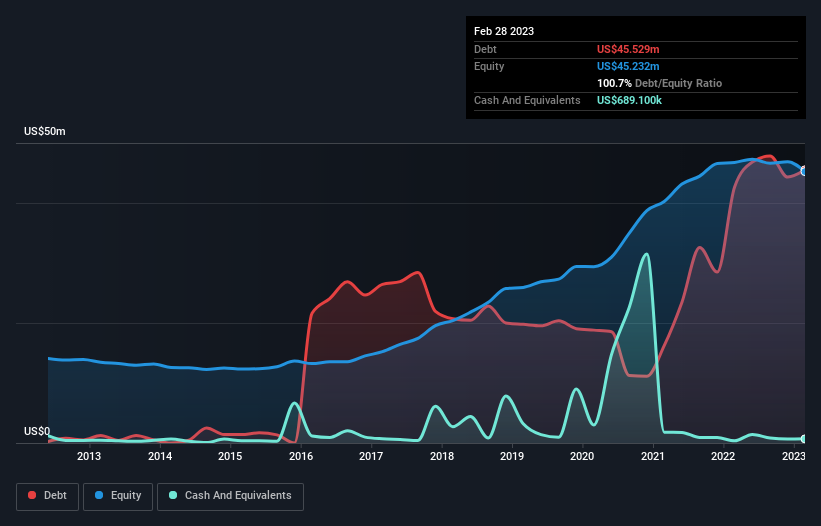- United States
- /
- Retail Distributors
- /
- NasdaqGM:EDUC
Educational Development (NASDAQ:EDUC) Has Debt But No Earnings; Should You Worry?
Some say volatility, rather than debt, is the best way to think about risk as an investor, but Warren Buffett famously said that 'Volatility is far from synonymous with risk.' When we think about how risky a company is, we always like to look at its use of debt, since debt overload can lead to ruin. We can see that Educational Development Corporation (NASDAQ:EDUC) does use debt in its business. But is this debt a concern to shareholders?
When Is Debt Dangerous?
Debt assists a business until the business has trouble paying it off, either with new capital or with free cash flow. Ultimately, if the company can't fulfill its legal obligations to repay debt, shareholders could walk away with nothing. However, a more usual (but still expensive) situation is where a company must dilute shareholders at a cheap share price simply to get debt under control. Of course, debt can be an important tool in businesses, particularly capital heavy businesses. The first step when considering a company's debt levels is to consider its cash and debt together.
Check out our latest analysis for Educational Development
How Much Debt Does Educational Development Carry?
You can click the graphic below for the historical numbers, but it shows that as of February 2023 Educational Development had US$45.5m of debt, an increase on US$42.7m, over one year. Net debt is about the same, since the it doesn't have much cash.

A Look At Educational Development's Liabilities
The latest balance sheet data shows that Educational Development had liabilities of US$54.1m due within a year, and liabilities of US$586.8k falling due after that. On the other hand, it had cash of US$689.1k and US$2.91m worth of receivables due within a year. So its liabilities total US$51.1m more than the combination of its cash and short-term receivables.
This deficit casts a shadow over the US$9.26m company, like a colossus towering over mere mortals. So we'd watch its balance sheet closely, without a doubt. At the end of the day, Educational Development would probably need a major re-capitalization if its creditors were to demand repayment. There's no doubt that we learn most about debt from the balance sheet. But it is Educational Development's earnings that will influence how the balance sheet holds up in the future. So if you're keen to discover more about its earnings, it might be worth checking out this graph of its long term earnings trend.
In the last year Educational Development had a loss before interest and tax, and actually shrunk its revenue by 38%, to US$88m. To be frank that doesn't bode well.
Caveat Emptor
While Educational Development's falling revenue is about as heartwarming as a wet blanket, arguably its earnings before interest and tax (EBIT) loss is even less appealing. Indeed, it lost a very considerable US$2.6m at the EBIT level. If you consider the significant liabilities mentioned above, we are extremely wary of this investment. That said, it is possible that the company will turn its fortunes around. Nevertheless, we would not bet on it given that it vaporized US$1.5m in cash over the last twelve months, and it doesn't have much by way of liquid assets. So we consider this a high risk stock and we wouldn't be at all surprised if the company asks shareholders for money before long. When analysing debt levels, the balance sheet is the obvious place to start. However, not all investment risk resides within the balance sheet - far from it. These risks can be hard to spot. Every company has them, and we've spotted 4 warning signs for Educational Development (of which 3 are a bit concerning!) you should know about.
Of course, if you're the type of investor who prefers buying stocks without the burden of debt, then don't hesitate to discover our exclusive list of net cash growth stocks, today.
Valuation is complex, but we're here to simplify it.
Discover if Educational Development might be undervalued or overvalued with our detailed analysis, featuring fair value estimates, potential risks, dividends, insider trades, and its financial condition.
Access Free AnalysisHave feedback on this article? Concerned about the content? Get in touch with us directly. Alternatively, email editorial-team (at) simplywallst.com.
This article by Simply Wall St is general in nature. We provide commentary based on historical data and analyst forecasts only using an unbiased methodology and our articles are not intended to be financial advice. It does not constitute a recommendation to buy or sell any stock, and does not take account of your objectives, or your financial situation. We aim to bring you long-term focused analysis driven by fundamental data. Note that our analysis may not factor in the latest price-sensitive company announcements or qualitative material. Simply Wall St has no position in any stocks mentioned.
About NasdaqGM:EDUC
Educational Development
Distributes children's books, educational toys and games, and related products in the United States.
Good value with low risk.
Similar Companies
Market Insights
Weekly Picks


The "Sleeping Giant" Stumbles, Then Wakes Up

Swiped Left by Wall Street: The BMBL Rebound Trade


Duolingo (DUOL): Why A 20% Drop Might Be The Entry Point We've Been Waiting For
Recently Updated Narratives


Hitit Bilgisayar Hizmetleri will achieve a 19.7% revenue boost in the next five years


GameStop will ace the financial crisis wave with its strategic Bitcoin investment and cash reserves


BABA Analysis: Buying the Fear, Holding the Cloud
Popular Narratives


A case for CA$31.80 (undiluted), aka 8,616% upside from CA$0.37 (an 86 bagger!).


NVDA: Expanding AI Demand Will Drive Major Data Center Investments Through 2026





